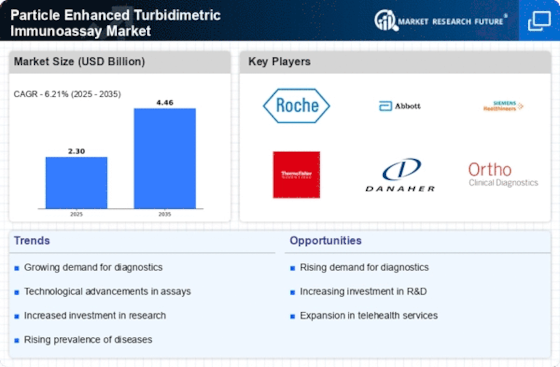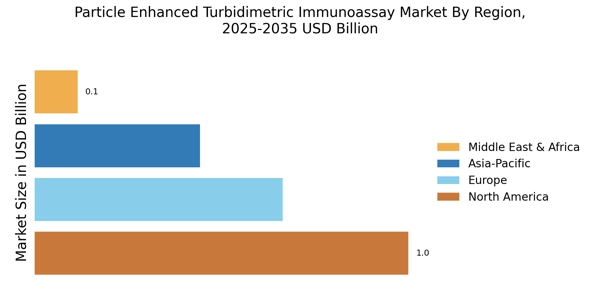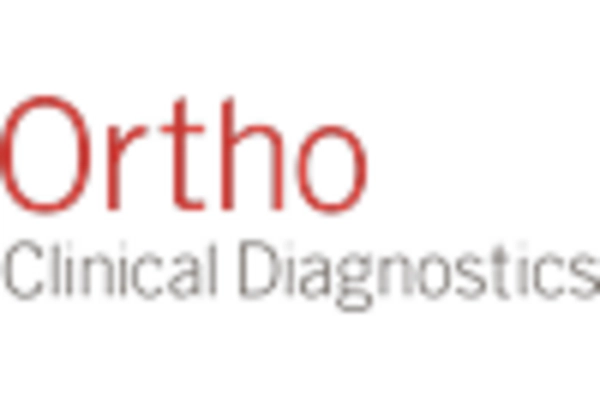Focus on Personalized Medicine
The Particle Enhanced Turbidimetric Immunoassay Market is increasingly aligned with the broader trend towards personalized medicine. This approach emphasizes tailoring medical treatment to individual characteristics, needs, and preferences, which necessitates precise diagnostic tools. The ability to measure specific biomarkers through turbidimetric immunoassays allows for more accurate disease stratification and treatment selection. As healthcare systems move towards more individualized care, the demand for assays that can provide detailed insights into patient health is expected to rise. Market analysts predict that the personalized medicine segment will significantly influence the growth trajectory of the Particle Enhanced Turbidimetric Immunoassay Market, as healthcare providers seek to implement more targeted therapies. This trend not only enhances patient care but also drives innovation within the industry.
Regulatory Support and Standardization
The Particle Enhanced Turbidimetric Immunoassay Market benefits from increasing regulatory support and standardization efforts aimed at improving assay quality and reliability. Regulatory bodies are establishing guidelines that ensure the accuracy and reproducibility of diagnostic tests, which is essential for gaining clinician and patient trust. This regulatory framework not only enhances the credibility of turbidimetric immunoassays but also encourages innovation within the industry. As manufacturers align their products with these standards, the market is likely to see an influx of new and improved assay technologies. Furthermore, the establishment of clear regulatory pathways can facilitate faster market entry for novel assays, thereby stimulating competition and growth in the Particle Enhanced Turbidimetric Immunoassay Market. This supportive environment is crucial for fostering advancements that meet the evolving needs of healthcare providers.
Rising Demand for Point-of-Care Testing
The Particle Enhanced Turbidimetric Immunoassay Market is witnessing a notable increase in demand for point-of-care testing solutions. This shift is largely attributed to the need for rapid diagnostic results in various healthcare settings, including emergency departments and outpatient clinics. The convenience of conducting tests at the site of patient care reduces the time to diagnosis, which is critical for effective treatment. Market data suggests that the point-of-care testing segment is expected to account for a significant share of the overall market, driven by the growing emphasis on patient-centric care. Additionally, the ability to perform tests without the need for extensive laboratory infrastructure further enhances the appeal of these assays. As healthcare providers seek to improve patient outcomes, the Particle Enhanced Turbidimetric Immunoassay Market is likely to expand in response to this demand.
Increasing Prevalence of Chronic Diseases
The Particle Enhanced Turbidimetric Immunoassay Market is significantly influenced by the rising prevalence of chronic diseases such as diabetes, cardiovascular disorders, and autoimmune conditions. As these diseases become more common, the need for effective diagnostic tools to monitor and manage patient health is paramount. The market is responding to this demand by developing assays that can detect disease markers with high precision. According to recent statistics, chronic diseases account for a substantial portion of healthcare expenditures, prompting healthcare systems to invest in efficient diagnostic solutions. This trend is likely to propel the growth of the Particle Enhanced Turbidimetric Immunoassay Market, as healthcare providers seek reliable methods for early detection and ongoing monitoring of chronic conditions. The focus on preventive care further underscores the importance of these assays in modern healthcare.
Technological Advancements in Assay Techniques
The Particle Enhanced Turbidimetric Immunoassay Market is experiencing a surge in technological advancements that enhance the sensitivity and specificity of assays. Innovations in reagent formulations and detection systems are leading to more accurate results, which is crucial for clinical diagnostics. For instance, the integration of automated systems is streamlining workflows, thereby reducing human error and increasing throughput. The market is projected to grow at a compound annual growth rate of approximately 8% over the next five years, driven by these advancements. Furthermore, the development of multiplex assays allows for the simultaneous detection of multiple analytes, which is particularly beneficial in complex disease states. This trend indicates a shift towards more efficient and reliable testing methodologies, positioning the Particle Enhanced Turbidimetric Immunoassay Market for substantial growth.

















